German Africa Relations
4th G20 investment summit
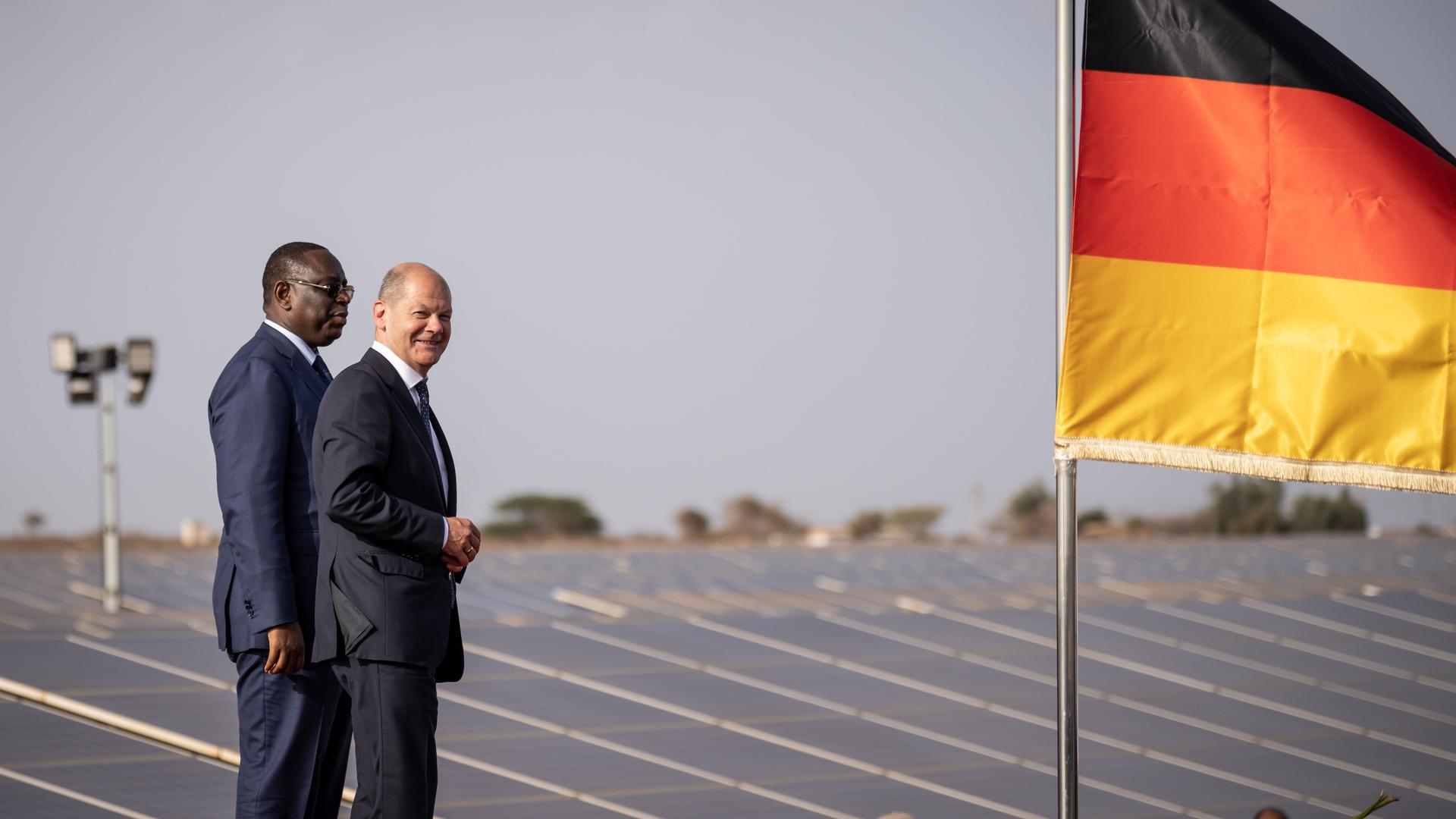
Die deutsche Wirtschaft möchte in Afrika aktiver werden. Denn im Zuge des russischen Angriffskriegs gegen die Ukraine und wachsender Spannungen mit China richten deutsche Unternehmen auf der Suche nach neuem wirtschaftlichen Potenzial ihren Blick vermehrt in afrikanische Länder.
© dpa / picture alliance / Michael KappelerG20 Investment Summit — German Business and the Compact with Africa Countries
Recently, Germany hosted the “G20 Investment Summit — German Business and the Compact with Africa Countries.” The 2023 summit aimed to enhance German-African business cooperation and unlock future potential in the areas of energy, trade, infrastructure, local added value, and new technologies. In the opening keynote speech, the German Chancellor, who is the summit’s patron, stated, “The African middle class has tripled in the last thirty years to 330 million women and men. It is the private sector; it is the courageous and innovative entrepreneurs across the continent who dare to do something and make this growth possible.” — Olaf Scholz
The summit gathered 800 participants and over 10 African heads of state from Nigeria, Ghana, Zambia, Togo, Côte d'Ivoire, the Kingdom of Morocco, Senegal, Congo, the Union of Comoros, and Benin among other countries. Two panel discussions with African heads of state and investment partners titled: Fostering Local Value Chains and Investments in Africa — The Role of the German Private Sector followed by a second discussion titled "Energy Supply and Green Industrialization Strategies — trade and investment opportunities in African emerging markets" were hosted.
As heads of state and economic leaders engaged in discussions aimed at accelerating investments within the continent, 40 young entrepreneurs from Africa, representing 16 countries, gathered in Berlin. They collaboratively worked on policy recommendations in a workshop hosted by the Federal Ministry for Economic Cooperation and Development. The young entrepreneurs built upon four key pillars: regulatory and legal frameworks, access to finance, networks and partnerships, and education and capacity building.
The workshop received a visit from the German chancellor, Olaf Scholz, who emphasised the crucial role of young entrepreneurs in developing businesses and innovations that move the private sector forward while contributing to sustainable and ecological solutions for the betterment of Africa. The developed recommendations were presented at the conference “Shaping the Future with Africa — Young Entrepreneurship as Key to a Just Transition.” The conference was hosted by the German Minister of Economic Development, Svenja Schulze, amongst other leaders and participants. Four young entrepreneurs took the stage to represent their groups in a session led by Mavis Owusu-Gyamfi, Executive Vice President of the African Center for Economic Transformation (ACET).
The African middle class has tripled in the last thirty years to 330 million women and men. It is the private sector, it is the courageous and innovative entrepreneurs across the continent who dare to do something and make this growth possible
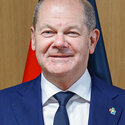
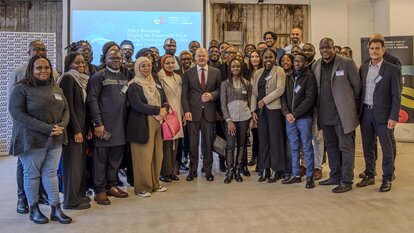
G20 Investment Summit — German Business and the Compact with Africa Countries, participants take a photo with Chancellor of the Federal Republic of Germany, Olaf Scholz.
© Africa Connect week _ GIZ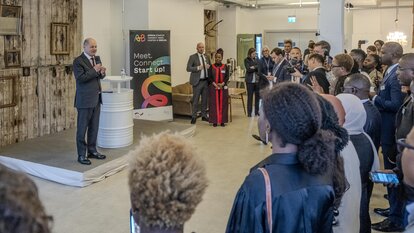
Chancellor of the Federal Republic of Germany, Olaf Scholz delivers his speech to 40 young entrepreneurs from Africa, representing 16 countries. This was at the "Shaping the Future with Africa — Young Entrepreneurship as Key to a Just Transition".
© Africa Connect week _ GIZ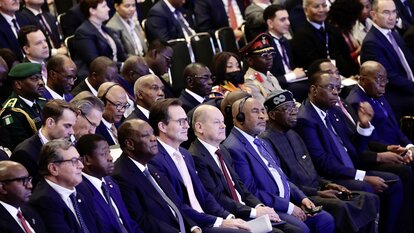
G20 Investment Summit — German Business and the Compact with Africa Countries
© Sub-Saharan Africa Initiative of German Busines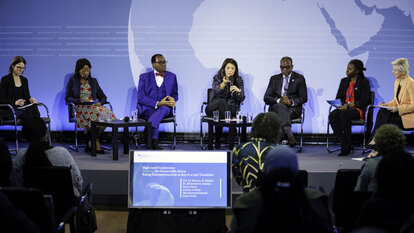
G20 Investment Summit — German Business and the Compact with Africa Countries
© Janine Schmitz - G20Four young entrepreneurs took the stage to represent their developed recommendations for favourable conditions for development for them
Edwige Takassi from the Democratic Republic of Congo focused on "access to finance," pinpointing the primary challenge as "the absence of adaptive, risk-adjusted financial solutions for startups in Africa," caused by gaps between the operational realities of startups and the policy frameworks of financiers. The recommended solution involves the adoption of innovative and inclusive blended finance initiatives encompassing startup financing, ecosystem support, and accountability for poorly executed projects or irresponsible spending of funds.
The next recommendation was presented by Ashton Tanatswa Mberi from Zimbabwe, who concentrated on the “regulatory and legal frameworks.” The challenge observed was the absence of a comprehensive government strategy in most African countries, coupled with insufficient involvement of young entrepreneurs in policymaking. The solution put forward was to establish inclusive multi-stakeholder platforms for policymaking on local, national, and regional levels.
Hidayet Ayadi Sghartoon from Tunisia, who addressed education and capacity building, made additional recommendations. They included enhancing national education curricula and rebranding TVET (Technical and Vocational Education and Training) to shift away from the perception of TVETs being an alternative education option for underperforming students.
The final recommendation was shared by Maurice Nii Adjei Cashinco from Ghana, whose group worked on Networks and Partnerships. Challenges varied from insufficient access to information to limited awareness of policymakers on startups. The recommended solution was centred on leveraging existing networks and building entrepreneurship communities for African youth to access training and technology.
Following the presentations, a panel discussion was held by the President of the African Development Bank (AFDB), Dr. Akinwumi Adesina, the Egyptian Minister of International Cooperation, Rania A. Al-Mashat, BMZ Africa Director Birgit Pickel, and two female entrepreneurs, Mariatheresa S. Kadushi from Tanzania, and Audrey S. Darko from Ghana. The discussion focused on how African and European decision-makers, entrepreneurs, and investors can best work together to create a good business climate and an enabling legal framework to support start-ups and their innovations. The entrepreneurs participating in the discussion shared their experiences of running startups in the areas of green solutions and health tech, as well as the foreseen impact of the recommended policies.
President Adesina stated that Africa's youth population of 477 million people will determine the future of the continent's economy. He stated that his number one responsibility is working on how to transform this demographic dividend into an economic dividend for Africa. In addition, he announced the creation of a high-level youth advisory board comprising young entrepreneurs attending this conference on behalf of youth in Africa. The objective will be for the AFDB president to directly gain insights into existing gaps and actively work with youth in the development of solutions within the African Development Bank.
